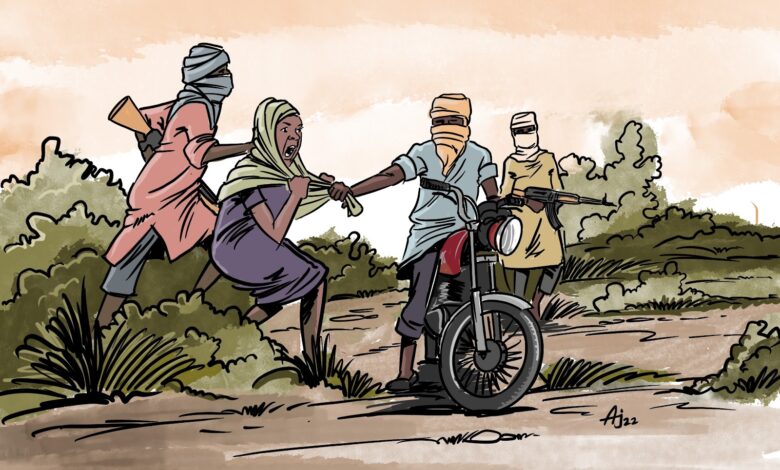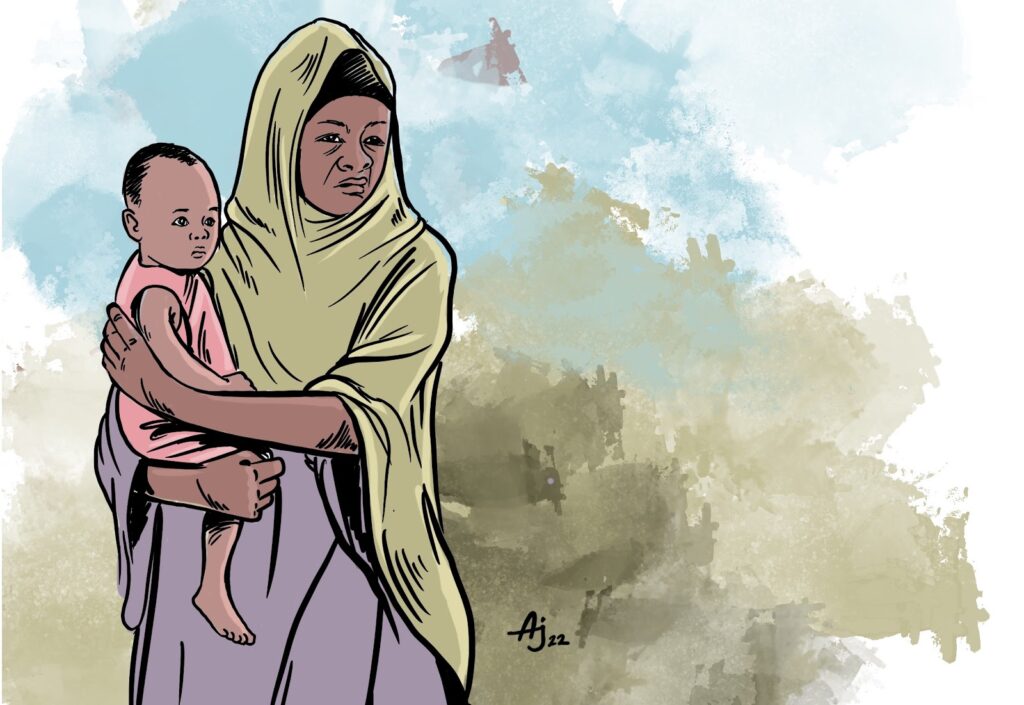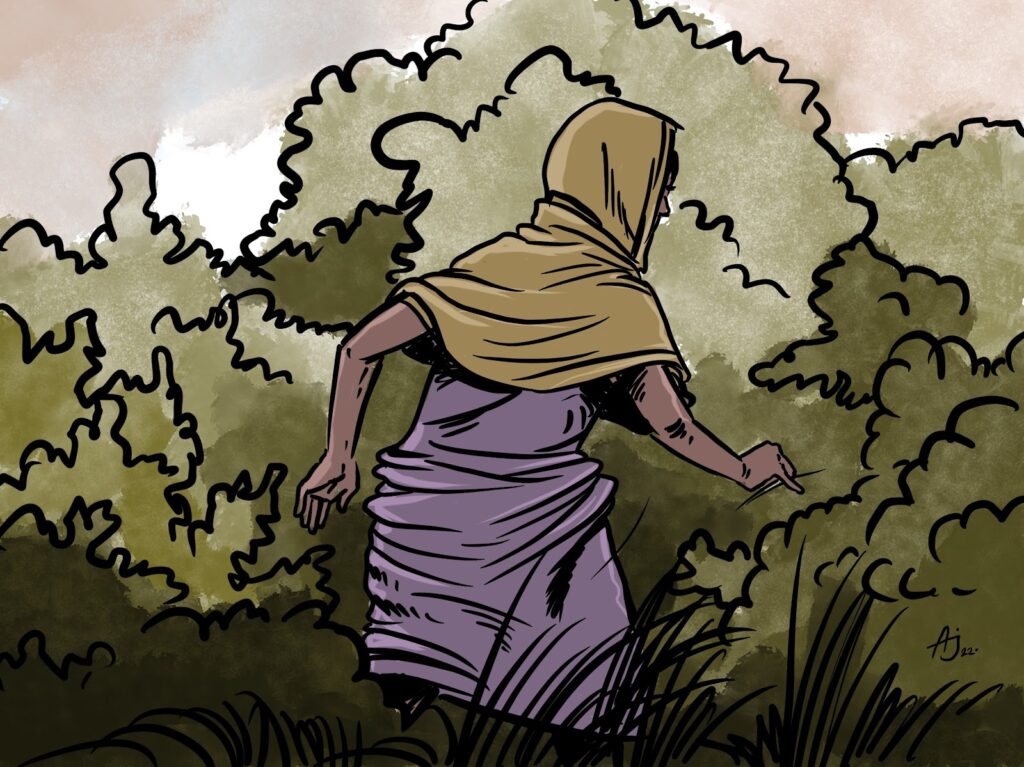After Being Kidnapped By Terrorists In Zamfara, Aisha Returned Home To A Different Life
Held by terrorists in their camp for three weeks, Aisha was gang raped every night, but her return turned into a new beginning when she discovered she was pregnant. Now, she is forced to adjust to this new role.

Aisha Mustapha’s life was not very different from any other young girl in Tungar-Bido village in Zamfara, Northwest Nigeria.
She was preparing for her engagement, but the arrival of the terrorists put a stop to all activities. And after her return from captivity, all of those plans were laid to rest.
“I lived with my grandmother before I was taken, she is blind, and I am the only one taking care of her. My father lived in a different village, but he didn’t visit or call after my return,” she says.
In 2021, the wife of the executive Governor of Zamfara State, Aisha Bello Muhammad Matawalle led a campaign as part of activities to mark 16 days of activism against gender-based violence. Part of these activities was a protest by teenagers to get the government to provide toll-free helplines for victims.
However, these activities and protests in the city have had no impact on the sexual and gender-based violence in the other local governments and villages crippled by banditry and kidnapping.
In the last eight years, Zamfara has moved from the most peaceful state in the country to a state riddled with violence, sexual exploitation, rape, kidnappings, and death.
Rape and sexual violence by terrorists are severely underreported in Nigeria. Kidnap and rape by the insurgents of Boko Haram in the northeast have made headlines in the past, but the situation in the northwest is as brutal and shocking.
“When they came, I tried to escape like all the other girls, but a bike hit me, and I was caught by them,” Aisha says.
The men demanded that she tell them the names of “all the rich men in town”, and when she couldn’t, they grabbed her and left. They continued questioning her when they arrived at their camp but still didn’t get what they were hoping for, so they locked her in a hut.
There is a lot of shame and stigma surrounding sexual violence cases in the state, the victim ends up being stigmatised by the community, and parents fear for the future marriage prospects of their daughters.
According to Ummulkhair Tahir, a lawyer who has worked in Zamfara, “Most of the cases don’t even make it to court. What we used to do sometimes to encourage reporting is to take the cases to the Shari’ah courts where the identity of the victim is protected. However, this doesn’t solve the problem because conviction is based on the confession of the perpetrator, and they get punished with lashes. Their identities are also not exposed, and the punishment doesn’t prevent the crime.”
Aisha’s ordeal lasted a long time.
“I was with them for three weeks. I didn’t know the path we followed, and each night, they came into my room and had their way with me. I was forced to accommodate at least four men every night.”
In some cases, women risk being shot dead if they try to resist the advances of the terrorists.
Throughout history, rape has been used as a tool to dominate, destroy or terrorise communities. For women like Aisha, their names fall under the underrepresented statistics with no organisations or centres set up to specifically help them process their trauma.
Zamfara state recorded about 122 cases of sexual and domestic violence within a span of 2 years. Cases spiked up during the COVID-19 lockdown.
“After three weeks, the man in charge took pity on me and demanded that they show me the way and let me go,” Aisha says.“I walked for hours without a human being in sight till I came across a bike man who took me to another village. I didn’t know the way because I didn’t know anything about the neighbouring villages. It took me hours to find my way home; I started walking after Subhi and got home after Isha prayers.”
As she speaks, Aisha holds a five-month-old baby to her chest.

She didn’t realise she was pregnant till she came back home. “My grandmother told me to hold on to my baby, and I shouldn’t take the advice of anyone who tells me to kill him because I don’t know what he will grow up and become.”
Even though that advice never came, Aisha remained determined to adjust to this new role and raise her child as best as she could.
Like many of the returning women, the villagers turned against her when she came back, making life and socialising difficult for the survivor.
“I struggle with going out sometimes because people whisper and point at me, gossiping about me and calling my son a bastard. Some refuse to talk to me or start making sarcastic comments every time I come close.”

However, Aisha is not deterred, she is willing to live a life as normal as possible and get married if any such offer comes her way.
Many women in the local governments do not have a source of livelihood to cater for their everyday needs. With a blind grandmother and an extra mouth to feed, Aisha is forced to go into the woods to cut down firewood or any plant/herb she can sell or use as food.
“My biggest wish is to live a healthy and long life with my son. I haven’t been to school in a long time, but I want my son to be very educated so he can get the best of both western and Islamic education.”
Support Our Journalism
There are millions of ordinary people affected by conflict in Africa whose stories are missing in the mainstream media. HumAngle is determined to tell those challenging and under-reported stories, hoping that the people impacted by these conflicts will find the safety and security they deserve.
To ensure that we continue to provide public service coverage, we have a small favour to ask you. We want you to be part of our journalistic endeavour by contributing a token to us.
Your donation will further promote a robust, free, and independent media.
Donate HereStay Closer To The Stories That Matter




